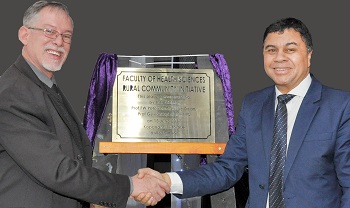Latest News Archive
Please select Category, Year, and then Month to display items
12 October 2020
|
Story Arina Engelbrecht
|
Photo Supplied
 Arina Engelbrecht from Organisational Development and Employee Well-being believes physical activity has a number of benefits for one’s health, including stress relief.
Arina Engelbrecht from Organisational Development and Employee Well-being believes physical activity has a number of benefits for one’s health, including stress relief.
Being physically active plays a big role in preventing the development of mental-health problems and in improving the quality of life of people experiencing mental-health problems.
Treatment for depression
Physical activity can be an alternative treatment for depression. It can be used as a stand-alone treatment or in combination with medication and/or psychological therapy. It promotes all kinds of changes in the brain, including neural growth, reduced inflammation, and new activity patterns are formed that promote feelings of calm and well-being. It releases endorphins – powerful chemicals in the brain that energise your spirit and make you feel good.
Physical activity can be very effective in relieving stress. Research in adults has found that physically active individuals tend to have lower stress levels compared to individuals who are less active. It also leads to improved sleep. When a person sleeps better and feels more rested, overall quality of life improves. They cope better with daily life stressors.
Reduce Alzheimer's risk
Regular physical activity can reduce your risk of developing Alzheimer's disease by up to 50%. It can also slow down further deterioration in those who have already started to develop cognitive problems. It stimulates the brain’s ability to maintain old connections as well as to make new ones.
A study asked people to rate their mood immediately after periods of physical activity (e.g. going for a walk/run, cycling, doing housework) and periods of inactivity (e.g. reading a book or watching television). Researchers found that participants felt more content, more awake, and calmer after being physically active compared to after periods of inactivity.
In conclusion, people who are physically active feel a sense of well-being, feel more energetic throughout the day, sleep better at night, have sharper memories, and feel more relaxed and positive about themselves and their lives.
“Being physically active not only changes your body, it changes your mind,
attitude, and your mood.” – Arina Engelbrecht
UFS Faculty of Health Sciences opens student residence in Trompsburg
2017-07-06

Official unveiling of the memorial plaque by
Prof Gert van Zyl, Dean of the Faculty of Health Sciences,
and Prof Francis Petersen, Rector and Vice-Chancellor
of the University of the Free State.
Photo: Charl Devenish
The University of the Free State’s (UFS) Faculty of Health Sciences has, as part of its commitment to student and community development, established a student residence in the town of Trompsburg in the Kopanong Local Municipality. The faculty officially opened the Rural Community Initiative and student residence in June 2017. The newly developed student residence has 10 apartments which could each accommodate six individuals. A housemaster resides on the premises and acts as manager of the facility. All areas of the residence are Wi-Fi covered and it has a 24-hour security service.
Importance of the residence
The goal of the Kopanang le fodise – Unite to heal programme is to develop a community-centred collaborative framework for sustainable, holistic healthcare and social development which is incorporated in the curricula of the faculty. During 2016, a total of 324 fourth-year students have each spent at least a week in primary healthcare facilities on a Community Based Education and Inter-Professional Education platform in Trompsburg and Springfontein in the Kopanong Municipality.
“This programme was commissioned to fulfil a specific goal. We are connecting our students with the community. The support of everyone coming together caused this to move from being just a spark, to a blaze. This is all our project,” said Dr René Botha, coordinator for Community-based Education and Rural Health in the faculty.
Community outreach a priority
“This is an innovative project that has been able to bring health and health-related issues to the community. One of the UFS’ three focus areas is community engagement. This project is primarily focused on serving the community, but also on the academic element, which is student development,” said Prof Francis Petersen, Rector and Vice-Chancellor of the UFS.
Prof Petersen commended the project on being the first of its kind in the South African Health Sciences sector. The platform will also be used for research purposes that will enrich the sector. Prof Petersen challenged the Kopanong community to give their input by answering two questions: What is the UFS good at? What is the UFS good for?
Reaching for the stars
“I am a dreamer and I have to reach, and if I reach, I reach for the stars. Today we are very lucky, because we have grabbed that star,” said Prof Gert van Zyl, Dean of the UFS Faculty of Health Sciences.
Prof Van Zyl reminded the audience that they possess the power to change challenges into stars by approaching them with careful thought, planning, and motivation. Prof Van Zyl concluded by stating that the rural community initiative is for the community, and that the faculty is just the facilitators.